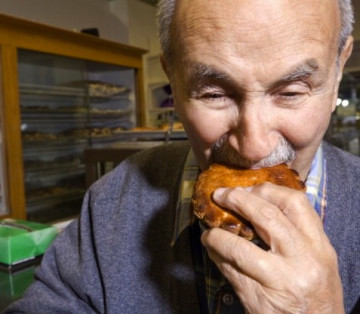Overeating Doubles Risk of Memory Loss in Seniors
Tuesday, February 14, 2012
New research suggests that consuming between 2,100 and 6,000 calories per day may double the risk of memory loss, or mild cognitive impairment (MCI), among people age 70 and older. MCI is the stage between normal memory loss that comes with aging and early Alzheimer’s disease.
“We observed a dose-response pattern which simply means; the higher the amount of calories consumed each day, the higher the risk of MCI,” said study author Yonas E. Geda, MD, MSc, with the Mayo Clinic in Scottsdale, Arizona and a member of the American Academy of Neurology.
The study, which was released this weekend, brought interest, and caution, from local experts. "Given that MCI puts people at risk for developing Alzheimer’s, the findings deserve further scrutiny," said Suzanne de la Monte, MD, a research scientist at Rhode Island Hospital, who had some questions about inferences drawn from the results.
GET THE LATEST BREAKING NEWS HERE -- SIGN UP FOR GOLOCAL FREE DAILY EBLASTWhich came first? Dementia or over-eating?
Since obesity and diabetes mellitus are clearly linked to cognitive impairment and dementia, de la Monte said, "it is logical that to become obese, caloric intake is likely to be elevated over a long period of time. However, in the early stages of dementia, people often become hyperphagic, i.e. they over-eat."
"Therefore," she said,"the study could have simply identified over-eating individuals who were in the early stages of dementia. Unfortunately, the study design does not allow one to distinguish cause from effect. Another question raised by the study is what was the nature of the excess calories? If the authors have indeed shown that over-eating increases risk for cognitive impairment, preventive measures should include knowing the food types that 'harm' the brain."
The study involved 1,233 people between the ages of 70 and 89 and free of dementia residing in Olmsted County, Minn. Of those, 163 had MCI. Participants reported the amount of calories they ate or drank in a food questionnaire and were divided into three equal groups based on their daily caloric consumption. One-third of the participants consumed between 600 and 1,526 calories per day, one-third between 1,526 and 2,143 and one-third consumed between 2,143 and 6,000 calories per day.
The odds of having MCI more than doubled for those in the highest calorie-consuming group compared to those in the lowest calorie-consuming group. The results were the same after adjusting for history of stroke, diabetes, amount of education, and other factors that can affect risk of memory loss. There was no significant difference in risk for the middle group.
“Cutting calories and eating foods that make up a healthy diet may be a simpler way to prevent memory loss as we age,” said Geda.
De la Monte pointed to several other dietary choices that can affect cognition as part of aging. "We have demonstrated that nitrosamines which are present in processed foods, commercial beers, and some (not all) cured meats and fish, cause Alzheimer type neurodegeneration with cognitive impairment," she said, "and that obesity makes things worse. Nitrosamines also cause diabetes and fatty liver disease (NASH)."
For patients who might want to avoid these substances, de la Monte has the following advice: "Read package labels and avoid foods that contain nitrates or nitrites as preservatives," she said. "Unfortunately, it is not always possible to get this type of information from restaurant/commercial food service menus. However, I have found that smaller private restaurants will provide food source details to their patrons."
Learn more about Alzheimer’s disease at http://www.aan.com/patients.
For more Health coverage, don't miss GoLocalTV, fresh every day at 4pm and on demand 24/7, here.
Related Articles
- Men More Vulnerable to Alzheimer’s Disease, Says New Study
- New Research: Moderate Drinking Might Prevent Alzheimer’s
- RI Hospital Part of Major National Alzheimer’s Disease Research



